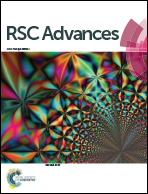Thermomechanical properties and equation of state for the γ-polymorph of hexahydro-1,3,5-trinitro-1,3,5-triazine
Abstract
The thermomechanical properties of the γ-polymorph of hexahydro-1,3,5-trinitro-1,3,5-triazine (RDX) are predicted using a non-reactive fully flexible Smith and Bharadwaj molecular potential using molecular dynamics simulations. The elastic modulus tensor, coefficients of thermal expansion, and lattice constants are calculated as functions of pressure (4–11 GPa) and temperature (200–550 K). Much like α-RDX, the components of the elastic modulus tensor of γ-RDX are found to increase monotonically with pressure, but soften only mildly with increasing temperature. Another interesting observation is that the b-lattice parameter is insensitive to temperature changes and is almost unchanged at higher pressures. A third order Birch–Murnaghan equation of state and the coefficients of thermal expansion are obtained from the pressure–volume–temperature (pVT) data. Around the α–γ phase transition pressure, the coefficients of thermal expansion for γ-RDX are greater than those of α-RDX. In contrast to α-RDX, the coefficients of thermal expansion for γ-RDX exhibit negligible variation with pressure. The predicted values of the thermomechanical properties and crystal parameters agree reasonably well with experimental results and other molecular simulations reported in the literature.


 Please wait while we load your content...
Please wait while we load your content...